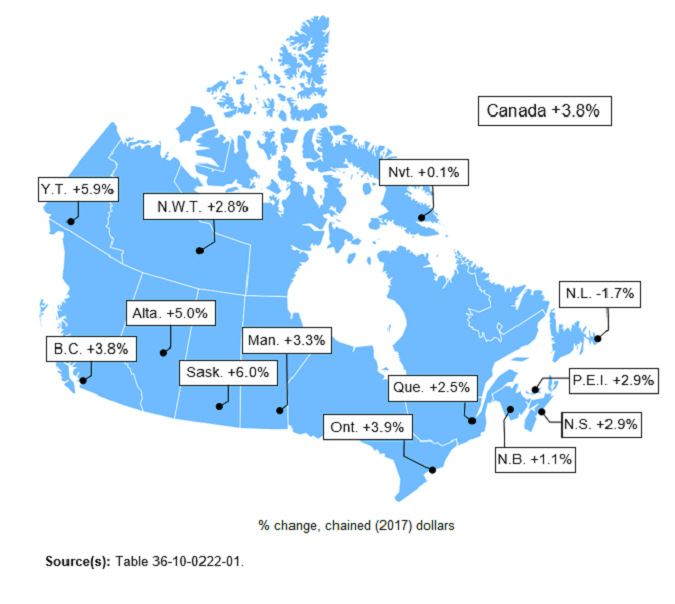Canada’s real gross domestic product (GDP) grew 3.8% in 2022, following a 5.3% increase in 2021. Growth in real GDP was driven by household spending, inventory accumulation and exports, according to a report released Wednesday by Statistics Canada.
Real GDP rose in nine provinces and in each of the territories, with Newfoundland and Labrador (-1.7%) recording the lone decline. Among the provinces, Saskatchewan (+6.0%), Alberta (+5.0%) and Ontario (+3.9%) had the largest annual increases in GDP, said the federal agency.
“Higher spending on services (+9.1%) drove the 5.1% increase in real household spending. As COVID-19 restrictions eased throughout 2022, households spent more on travelling abroad, air transport, and food and non-alcoholic beverage services,” it said.
“Among the provinces, Ontario (+7.1%) had the highest growth in household spending, followed by Quebec (+4.9%) and Manitoba (+4.5%).”=
StatsCan said Canada’s imports of goods and services rose 7.6%, exceeding the 3.2% growth of exports, resulting in a negative impact on GDP in 2022. Imports grew in all provinces and territories except Nunavut (-13.7%) and New Brunswick (-1.1%). Prince Edward Island (+8.1%), British Columbia (+8.0%) and the Northwest Territories (+7.8%) had the highest growths in imports, driven by international trade rather than interprovincial trade. Yukon (+6.6%), the Northwest Territories (+6.5%) and British Columbia (+6.4%) recorded the highest growths in exports.
“Construction of non-residential structures increased 6.7% in 2022. Alberta and British Columbia were major contributors to this growth, which was led by oil and gas engineering projects, utilities and pipeline construction,” said the report.
“Business investment in intellectual property products rose 6.0%, reflecting higher expenditures on mineral exploration and evaluation and increased business investment in software. Alberta and Newfoundland and Labrador were the largest contributors to increased mineral exploration and evaluation expenditures. Ontario recorded a substantial increase in business investment in software.
“Following a record-high housing investment in 2021, housing investment declined 12.1% in 2022, coinciding with increased interest rates. The decline was more pronounced in Ontario and British Columbia, where ownership transfer costs, which represent resale activity, fell sharply.”

Mario Toneguzzi
Mario Toneguzzi is Managing Editor of Canada’s Podcast. He has more than 40 years of experience as a daily newspaper writer, columnist, and editor. He was named in 2021 as one of the Top 10 Business Journalists in the World by PR News – the only Canadian to make the list)
About Us
Canada’s Podcast is the number one podcast in Canada for entrepreneurs and business owners. Established in 2016, the podcast network has interviewed over 600 Canadian entrepreneurs from coast-to-coast.
With hosts in each province, entrepreneurs have a local and national format to tell their stories, talk about their journey and provide inspiration for anyone starting their entrepreneurial journey and well- established founders.
The commitment to a grass roots approach has built a loyal audience on all our social channels and YouTube – 500,000+ lifetime YouTube views, 200,000 + audio downloads, 35,000 + average monthly social impressions, 10,000 + engaged social followers and 35,000 newsletter subscribers. Canada’s Podcast is proud to provide a local, national and international presence for Canadian entrepreneurs to build their brand and tell their story.






